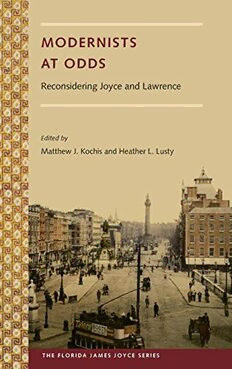
Modernists at odds : reconsidering Joyce and Lawrence PDF
Preview Modernists at odds : reconsidering Joyce and Lawrence
Modernists at Odds The Florida James Joyce Series University Press of Florida Florida A&M University, Tallahassee Florida Atlantic University, Boca Raton Florida Gulf Coast University, Ft. Myers Florida International University, Miami Florida State University, Tallahassee New College of Florida, Sarasota University of Central Florida, Orlando University of Florida, Gainesville University of North Florida, Jacksonville University of South Florida, Tampa University of West Florida, Pensacola MODERNISTS AT ODDS Reconsidering Joyce and Lawrence Edited by Matthew J. Kochis and Heather L. Lusty Foreword by Sebastian D. G. Knowles University Press of Florida Gainesville / Tallahassee / Tampa / Boca Raton Pensacola / Orlando / Miami / Jacksonville / Ft. Myers / Sarasota Copyright 2015 by Matthew J. Kochis and Heather L. Lusty All rights reserved Printed in the United States of America on acid-free paper This book may be available in an electronic edition. 20 19 18 17 16 15 6 5 4 3 2 1 Library of Congress Cataloging-in-Publication Data Modernists at odds : reconsidering Joyce and Lawrence / edited by Matthew J. Kochis and Heather L. Lusty ; foreword by Sebastian D. G. Knowles. pages cm — (The Florida James Joyce series) Includes index. ISBN 978-0-8130-6047-7 1. English fiction—20th century—History and criticism. 2. Joyce, James, 1882–1941— Criticism and interpretation. 3. Lawrence, D. H. (David Herbert), 1885–1930—Criticism and interpretation. 4. Modernism (Literature)—Great Britain. I. Kochis, Matthew J., editor. II. Lusty, Heather L., editor. III. Knowles, Sebastian D. G. (Sebastian David Guy), Author of introduction, etc. IV. Series: Florida James Joyce series. PR6019.O9Z7284 2015 823'.912—dc23 2014033322 The University Press of Florida is the scholarly publishing agency for the State University System of Florida, comprising Florida A&M University, Florida Atlantic University, Florida Gulf Coast University, Florida International University, Florida State University, New College of Florida, University of Central Florida, University of Florida, University of North Florida, University of South Florida, and University of West Florida. University Press of Florida 15 Northwest 15th Street Gainesville, FL 32611-2079 http://www.upf.com Contents List of Figures vii Foreword ix Acknowledgments xi List of Abbreviations xiii Chronologies xvii Introduction: Injoynted Perspectives 1 Heather L. Lusty 1. Lady Chatterley’s Lover and Ulysses 11 Zack Bowen 2. Love, Bodies, and Nature in Lady Chatterley’s Lover and Ulysses 28 Margot Norris 3. The “Odd Couple” Constructing the “New Man”: Bloom and Mellors in Ulysses and Lady Chatterley’s Lover 39 Earl G. Ingersoll 4. The End of Sacrifice: Joyce’s “The Dead” and Lawrence’s “The Man Who Died” 61 Gerald Doherty 5. The Isis Effect: How Joyce and Lawrence Revitalize Christianity through Foreignization 80 Martin Brick 6. “In Europe They Usually Mention Us Together”: Joyce, Lawrence, and the Little Magazines 99 Louise Kane 7. Lawrence and Joyce in T. S. Eliot’s Criterion Miscellany Series 131 Eleni Loukopoulou 8. An Encounter with the Real: A Lacanian Motif in Joyce’s “The Dead” and Lawrence’s “The Shadow in the Rose Garden” 161 Hidenaga Arai 9. Masochism and Marriage in The Rainbow and Ulysses 175 Johannes Hendrikus Burgers and Jennifer Mitchell 10. That Long Kiss: Comparing Joyce and Lawrence 196 Enda Duffy 11. “Result of the Rockinghorse Races”: The Ironic Culture of Racing in Joyce’s Ulysses and Lawrence’s “The Rocking-Horse Winner” 210 Carl F. Miller List of Contributors 229 Index 233 Figures 7.1. D. H. Lawrence’s Pornography and Obscenity, Criterion Miscellany No. 5, 1929 141 7.2. Contents page, October 1929 issue of Criterion 144 7.3. Front cover of James Joyce’s Anna Livia Plurabelle, first edition, 1930 152 Foreword According to Stephen Dedalus, the fundamental flaw in the hockey game that takes place after his history lesson is that “Cochrane and Halliday are on the same side.” So it is with Joyce and Lawrence: in order for the great game of modernism to be played at its highest level, the two players must line up on op- posite sides. According to T. S. Eliot, in his heretical book After Strange Gods, Lawrence is the heretic, and Joyce the orthodox writer, an unorthodox argu- ment that Stephen Spender later overturned. But which is which? Would it not be fairer to say that Joyce is the more heretical writer, fledged on Ibsen’s celebration of individual choice, while Lawrence remained true to the circum- scribed world of the subject of his early literary study, Thomas Hardy? The answer provided in this excellent reappraisal is that they can be both, but not at the same time. They are contraries, in the Blakean sense: two elements in continual opposition. As Blake says in The Marriage of Heaven and Hell, “Op- position is true Friendship”; Joyce and Lawrence are eternally at odds, each a Scylla to the other’s Charybdis. Modernism’s original odd couple, as Earl Ingersoll calls them in this volume, they shared the same literary agent (James Pinker, whose death in 1922 was possibly the most significant literary event of that year, given a clientele that included Henry James, Ford Madox Ford, G. B. Shaw, and Thomas Mann), fought similar legal battles against the censor, and had the common distinction of being pirated by Samuel Roth. Louise Kane shows us how their work rubs together in the pages of the Egoist, tracking their movements through the literary magazines of the time. Brancusi’s Symbol of Joyce, the rock and the whirlpool, is as much a symbol of Lawrence as it is a symbol of both. In The Good Soldier, John Dowell famously likens Leonora and Florence to a greyhound and a retriever: that’s as good an analogy as any for Joyce and Lawrence, both in life and art. They belong to the same great group: both are at once syncretists and fragmenters, bourgeois cosmopolitans, prudish liber-
